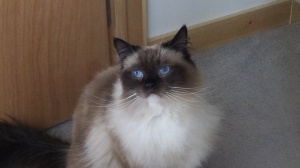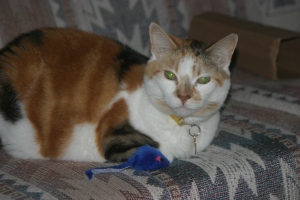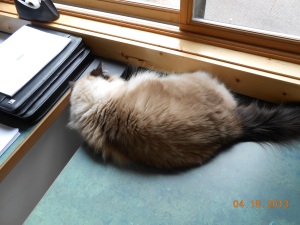The unobtrusive presence of a cat is conducive to writing. They respect the long periods of silence and intense concentration their owners require for composition. A cat has been an ever-present muse in my writing room. However, if neglect extends to not refilling her bowl for a long time, she will gently remind the writer by walking back and forth across the computer keyboard.

Molly, my rag dolly, born a cradle Mormon in Utah, converted to Catholicism upon my adoption 3/28/13
My long-held supposition that cats are the preferred pet of most writers needed evidence. I set out to test this hypothesis. Selecting authors I like, I began my research into whether they were also cat lovers.
The first writer I selected was Anne Rice. Lo and behold, she is the proud owner of a furry white cat. Next I selected Joyce Carol Oates. My suspicions were confirmed there too. She owns a lovely cat Cherie, the subject of her children’s book. With Daniel Halpern she edited the anthology The Sophisticated Cat: A Gathering of Stories, Poems and Miscellaneous Writings about Cats. Oates, one of the most prolific writers, attributed her legendary productivity to cats, stating “I write so much because my cat sits on my lap. She purrs so I don’t want to get up.” May Sarton, best known for her journals, wrote twenty novels and seventeen poetry books. She lived with her cat Bramble by the sea in York, Maine. Her novel The Fur Person attests to her affinity with cats. I have written elsewhere how I regret that Sarton’s novels are not more widely read. Sarton said, “Time spent with cats is never wasted.” I have to concur.
Women writers may have a predictable proclivity for cats, but what about male writers? Certainly, T.S. Eliot is well-known for his fondness for the feline as evidenced in his Old Possum’s Book of Practical Cats, basis of the Broadway hit musical Cats. I was pleasantly surprised to learn that a macho man like Ernest Hemingway owned twenty-three cats. I expected the avid hunter to be a diehard dog lover. On the contrary, he respected highly cats and is quoted as saying: “A cat has absolute emotional honesty: human beings, for one reason or another, may hide their feelings, but a cat does not.” Hemingway called cats “purr factories” and “love sponges.” Another prolific writer, Stephen King, is a cat owner whose cat Clovis fingered in his screenplay Sleepwalkers, continuing the role cats have played in his work since the unforgettable cat Church in Pet Sematary. My delight was unbounded when I discovered that Neil Gaiman (I much admired his American Gods) is the owner of not just one but several cats. The prolificness of these writers and the presence of cats in their lives must be correlated.
Clearly, cats have served both as muse for writers and as characters in their writings. I have also used them in my work, first in the creation of Odette, the Persian cat in my novel Gerontion and the Maiden. She is the pet of main female character Felicia, a young ambitious woman who marries a rich, much older man for security. I have Felicia give this analysis of the cat’s personality:
The cat slinked into her lap and she stroked Odette’s long cream-colored coat. The pudgy feline purred smoothly like a fine-tuned motor in a just audible murmur. Felicia appreciated the cat’s satisfaction, poise and control—qualities she not only admired in animals but also in people. Not surprising cats were revered as sacred in some ancient cultures. Unlike the slobbering manner of dogs, they carried themselves with considerable dignity. And in their fashion faithful. They demanded affection without cloying, and in return, conferred respect. Odette required space in the same way Felicia set parameters on friendships.
Now as the Persian nestled against her stomach and accepted her attention, Felicia appreciated once more her pet’s uncanny intelligence. Odette understood her moods, only imposing her presence when she knew her mistress was completely relaxed, taking the cue from Felicia’s position curled up on the sofa with the tea cup. Her habits were imprinted on the cat’s brain. At the appointed time she awaited Felicia’s arrival home from work, poised upon the windowsill watching for her. When it was time for bed, all Felicia needed to do was whistle and Odette leapt into bed, settling into the small of her back as she lay on her stomach. The cat’s eyes shone like runway lights, guiding Felicia to the bathroom at night. Understandable that men preferred dogs. A good match, the dog governed by a need to serve and man to receive undivided attention. But woman desired a clean, unobtrusive, undemanding but comfortable companion, or at least, Felicia was one woman who did.
“Odette, sweetheart, you’re woman’s best friend,” she murmured to the contented feline. “More stable and kind than either a man or a woman. I don’t get your cast-off toms, do I?”
Cats assume a major role in my novel Delayed Reaction. The hero in the novel owns seven cats. Jake, an aging Vietnam veteran, names them for key players during that period of American history: Ho Chin Minh, a grey-pointed Siamese; Madame Nhu, a fluffy, cream-colored Persian; Melvin Lard Butt, a black Manx; Kiss-Ass Kissinger, a tortoise-shell with white patch over one eye; Miss Saigon, a tawny Burmese with black paws; Wacky-Macky McNamara, an orange tabby; and Buddha, a three-legged grey tiger. Cats are the catalyst for a drastic change in Jake’s outlook on life and trigger a series of events in which he becomes the mentor and friend to a teenaged boy.
Cats have traits that account for this compatibility with the writing life and writers’ fondness for them. They are solitary, independent creatures just like their owners. They are discriminating and do not suffer fools gladly, preferring to isolate themselves instead of socializing with nincompoops. Prolific writers are ones who are content to spend long hours alone. Solitude does not bother them. In school writers are rarely voted most popular. Popularity is not their goal nor is a cat concerned if it is liked or disliked. If anything a cat likes to rub against the leg of a person who dislikes him. Similarly, a writer will not shy from offending those of contrary opinions or debunking the majority viewpoint for the sake of opening up a larger vision of the world. Cats are nonchalant. Cats are low maintenance. They have dignity and a quiet intelligence. Their respect must be gained. The fawning, licking, rambunctiousness, yapping and sycophancy of dogs are not conducive to the writing life or the typical writer’s personality. A cat, I conclude, is the pet that prolific writers pick for company in the solitary art of writing. Molly has been curled up on my desk while I wrote this disquisition on cats and writing. I’ll sign off with a long mee-ee-ee-ow-ow-ow.





